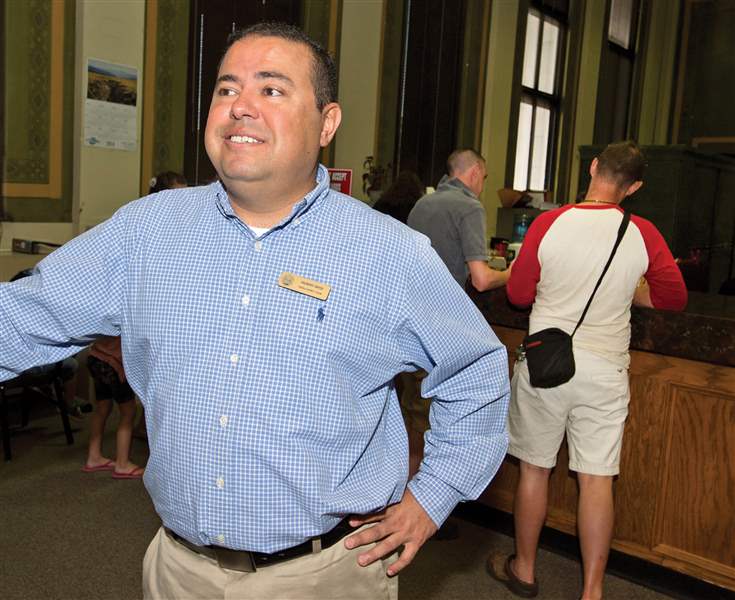
Third Colorado county issues marriage licenses to gay couples; legal fight still unresolved
7/11/2014
Pueblo County Clerk Bo Ortiz talks about his decision to issue marriage licenses to same-sex couples on Friday, July 11, 2014, at the county courthouse in Pueblo, Colo. (AP Photo, Chris McLean/The Pueblo Chieftain)
ASSOCIATED PRESS
DENVER — A third Colorado county began issuing marriage licenses to gay couples Friday even though the legal fight is far from resolved in the state.
Pueblo County joined Denver and Boulder County in allowing gay couples to marry a day after a state judge ruled the Boulder clerk can continue issuing the licenses.
Twelve couples were issued licenses in Pueblo County by midday, including two people from Mississippi who heard the news while traveling through the state and decided to get a license, Clerk Gilbert Ortiz said.
Some couples exchanged vows outside the clerk’s office while others took them home to hold a ceremony later.
Colorado’s 2006 voter-approved gay marriage ban remains on the books. But District Court Judge Andrew Hartman noted it is “hanging on by a thread” following rulings by another state court and the 10th U.S. Circuit Court of Appeals.
In Denver, Clerk Debra Johnson began granting gay-marriage licenses Thursday afternoon, shortly after Hartman issued his ruling. The county has granted about 40 licenses to gay couples.
Colorado Attorney General John Suthers had sought to block the issuing of licenses, warning of “legal chaos.” In a statement Thursday, he pledged to go to the state Supreme Court as soon as possible “to prevent a legal patchwork quilt from forming.”
In Boulder County, more than 120 couples have married since its clerk started issuing licenses two weeks ago, when the appeals court found Utah’s gay marriage ban unconstitutional.
The ruling became law in all six 10th Circuit states — including Colorado — but the panel immediately put it on hold while Utah appeals to the U.S. Supreme Court.
On Wednesday, District Judge C. Scott Crabtree struck down Colorado’s ban, joining multiple other judges who have done the same in other states. Crabtree also placed his ruling on hold while the legal battle plays out.
Democratic Gov. John Hickenlooper has asked Suthers, a Republican, not to appeal.
“The decision on marriage by Judge Crabtree puts Colorado on the right side of history,” Hickenlooper said.
In the Boulder case, Hartman found the licenses were harmless and an acceptable form of civil disobedience. But he required that all couples be warned their marriage could lack legal value if a court later upholds Colorado’s ban.
His decision left clerks around the state trying to figure out what to do next.
They must weigh the risk of issuing licenses that might become invalid with violating people’s rights by declining to do so, Mesa County Clerk Sheila Reiner said. “It’s sort of a rock and a hard place,” she said.
Ortiz said he read all three of the rulings affecting Colorado, but the Boulder ruling convinced him to issue the licenses, especially its reference to St. Augustine’s belief that “an unjust law is not law at all.”
“The scale of justice started leaning toward individual rights for me,” said Ortiz, who married his friends Bob Hudson and Mike Lawson.
There is no guarantee the nation’s highest court will take the case when it returns in October. But situations like the one in Colorado add to the pressure for a final, definitive ruling on gay marriage in the U.S.
Same-sex marriage is legal in 19 states and the District of Columbia, but it’s in limbo in much of the rest of the nation. Seemingly every week, another gay marriage ban is struck down. Sometimes marriages start immediately; other times the rulings are put on hold and nothing happens.